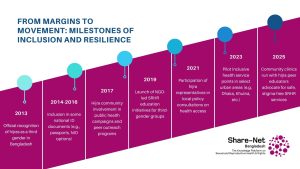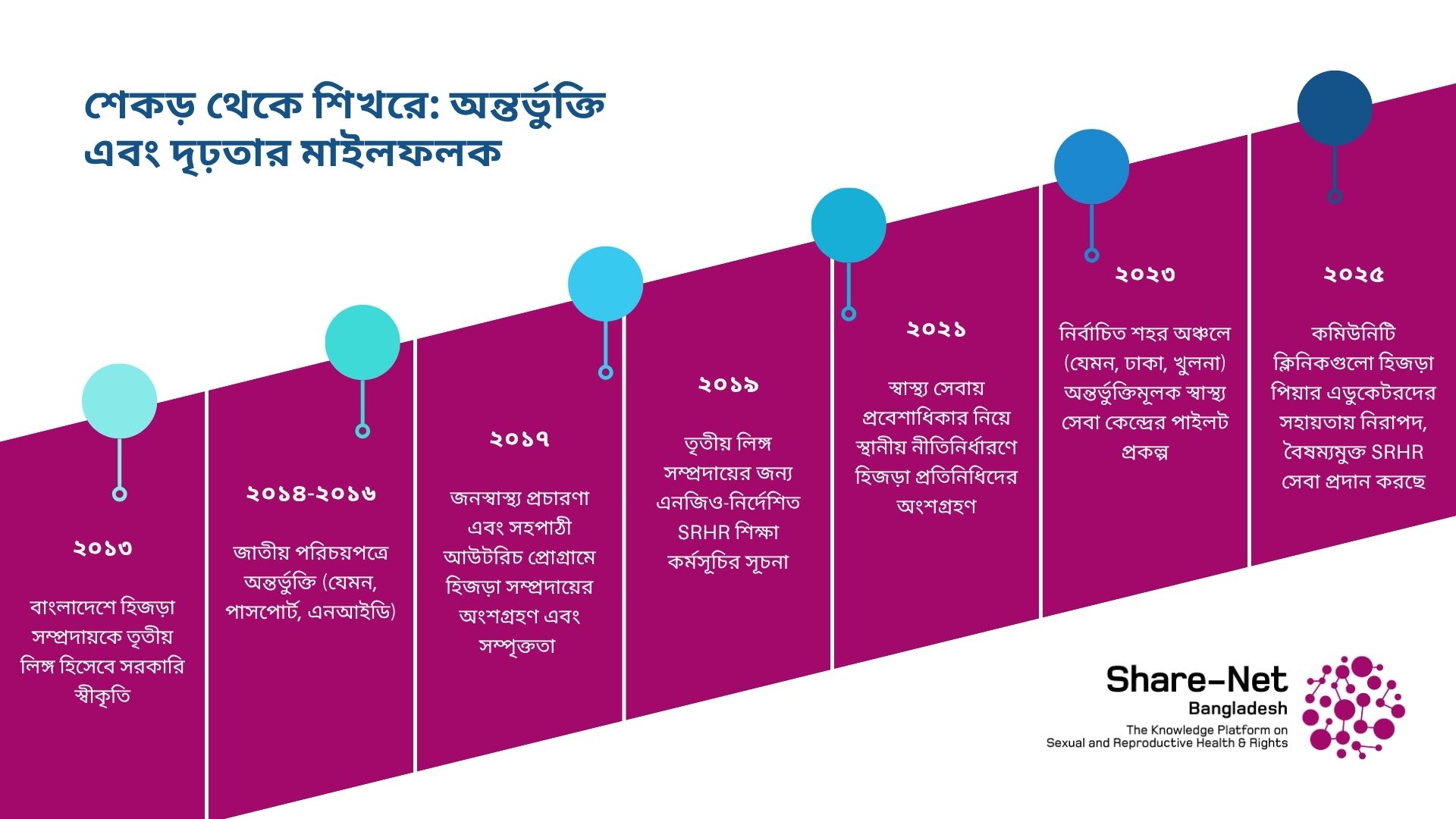From Margins to Movement: Milestones of Inclusion and Resilience
In a country where gender norms have long shaped social and institutional systems, the journey of the Hijra community in Bangladesh, from the margins of society toward recognition and inclusion, has been marked by quiet resilience, collective advocacy, and the power of community networks. As conversations around equity and inclusion gain momentum globally and nationally, under the theme “The Power of Communities”, it is essential to reflect on Bangladesh’s progress – the milestones achieved, the community-led efforts that have paved the way, and the continued need to build a society where dignity, access, and respect are extended to all, regardless of sexual and gender identities, from marginalisation to acceptance.
2013 – A Landmark Recognition: Official Recognition of Hijras as a Third Gender
The Government of Bangladesh officially recognised Hijras as a third gender in November 2013. This historic move acknowledged the identity of a marginalised community that had long faced discrimination in public services, education, and healthcare. It was not just symbolic; it paved the way for the inclusion of them in official documentation and policy frameworks.
Source: Ministry of Social Welfare, Government of Bangladesh, 2013 press statement on third gender recognition. Human Rights Watch
2014–2016 – Gaining Ground in Identification: Inclusion in National Identification Documents
Following recognition, there were progressive changes in administrative systems. By 2014, National ID cards and passports began to include an option for a third gender, enabling many to legally identify themselves as a citizen of the country and access basic services. While challenges remained, such as inconsistent implementation, this period marked an early shift toward institutional visibility.
Source: The Daily Star
2017 – Community Health Participation in Public Health Campaigns
In 2017, Hijra individuals began to be engaged in public health campaigns, especially around HIV prevention, awareness and sexual health. Peer outreach programmes led by community-based organisations empowered Hijra educators to spread accurate health information in ways that were culturally sensitive and community-led.
Source: UNDP & Bandhu Social Welfare Society reports on gender-inclusive health outreach in Bangladesh.
2019 – Launch of NGO-led Focused SRHR Education Initiatives
Several Non-Governmental Organisations (NGOs), including Bandhu, Marie Stopes Bangladesh, and others, launched Sexual and Reproductive Health and Rights (SRHR) education programmes tailored to the needs of third-gender groups in 2019. These initiatives aimed to provide not just information but also rights, awareness, counselling and referrals in order to ensure comprehensive health education and services to the Hijra community.
Source: Share-Net Bangladesh & Bandhu case documentation, 2019.
2021 – Engagement in Policy Consultations on Health Access
In a notable shift, Hijra representatives began participating in local policy consultations concerning health access where they shared their experiences and advocated for inclusive service delivery, aiming that their voices and needs were considered in health policy formulations. This marked a growing recognition of their voice not just as service recipients but as stakeholders in health systems.
2023 – Inclusive Health Pilots in Urban Areas
In 2023, pilot projects were launched to establish inclusive health service points in selected urban areas like Dhaka and Khulna. These centres aimed to provide stigma-free health services to the Hijra community. Staff were sensitised on gender diversity, and peer educators were integrated into service delivery models.
Source: Local Health Authorities & NGO implementation updates (2023)
2025 – Community Clinics Operated by Hijra Peer Educators
As of 2025, community clinics operated by and led with Hijra peer educators are advocating for safe and stigma-free SRHR services in key urban areas. These clinics serve as safe spaces for the community to access health services and information, SRHR consultations, referrals, and community dialogue. These clinics advocate not only for health but also for dignity and respect, reinforcing that access must be free from stigma and discrimination.
Looking Ahead
These milestones reflect the ongoing efforts and resilience of the Hijra community in Bangladesh. While these milestones demonstrate progress, systemic barriers remain, and Hijra and other gender-diverse communities continue to face stigma, violence, and economic exclusion. Furthermore, even though significant progress has been made, continued support and inclusive policies are essential to ensure equal rights and opportunities for all.
As we honour “The Power of Communities”, let this serve as a call to amplify inclusive policy, fund community-led services, and promote respectful engagement across society. Inclusive SRHR is not a privilege – it is a right. And it must include everyone.


